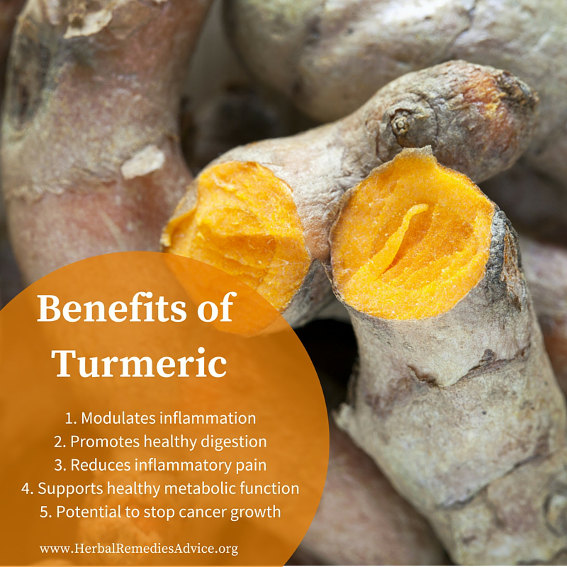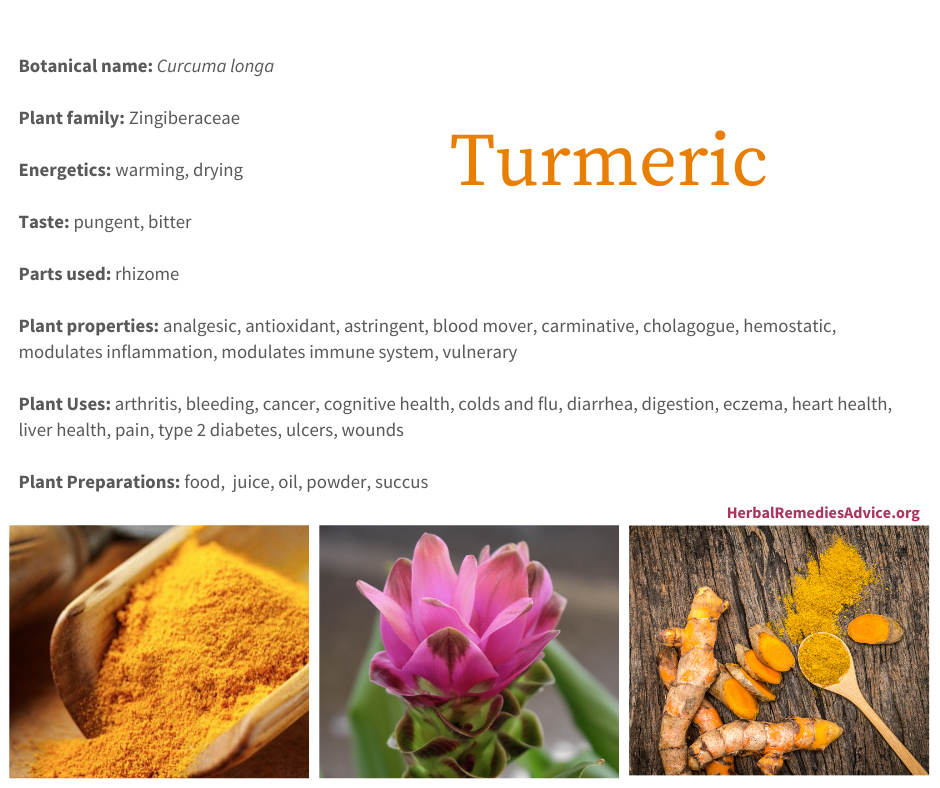Get weekly tips, recipes, and my Herbal Jumpstart e-course! Sign up for free today.

Turmeric Benefits
Share this! |
|
Turmeric benefits have been known in India, China, and Africa for thousands of years and have been used for countless ailments, and turmeric has never gone out of style. In recent years, turmeric has also caught the attention of researchers and it has quickly become one of the most studied medicinal herbs.
During the course of writing this monograph, I reviewed hundreds of studies involving turmeric and curcumin. At times I felt like I could type “turmeric + whatever-disease-I-could-think-of” into the PubMed database and get results. There is truly a lot of turmeric research out there!
While you may be familiar with the bright orange powder of turmeric, it’s also worth getting to know the plant. In western herbalism we most often use the root or rhizome, which looks similar to ginger (they’re related). The plant can be grown in USDA zones 8 or higher or in a greenhouse. Fresh turmeric is increasingly available at grocery stores; ask your produce department to carry it if they don’t already.
Turmeric Benefits: Energetics
While turmeric is often hailed as an all-purpose herb that can be used for an impressively wide range of health issues, it isn’t for everyone. This pungent and bitter herb is somewhat warming and very drying. When taken in larger than normal culinary amounts, it’s not uncommon to see side effects relating to dryness such as dry eyes, dry mouth, night sweats, etc.
For some people this dryness can be balanced in a couple of ways. Turmeric can be prepared as golden milk, a traditional preparation from India that involves lots of liquid and fat (traditionally dairy milk). Or lower dosages can be used. For those who are very dry, turmeric may not be the best herbal match.
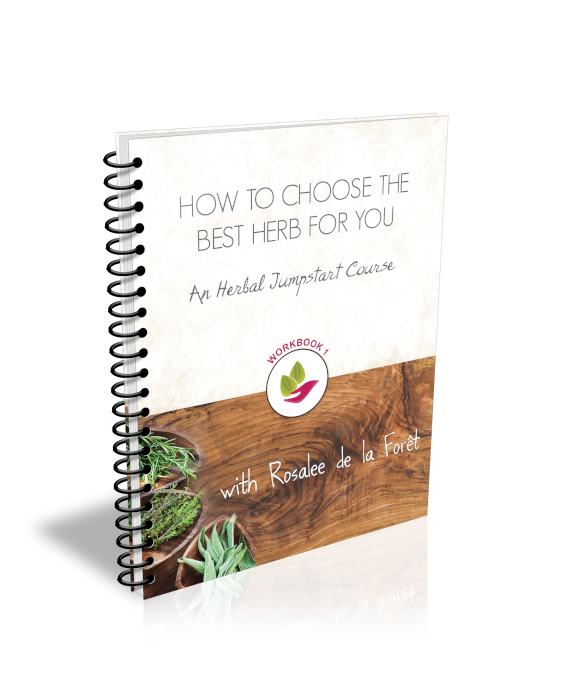
Choose the Best Herb for You!
The secret to using herbs successfully begins with knowing who YOU are.
Get started by taking my free Herbal Jumpstart e-course
By signing up for my free course you’ll also be joining my weekly newsletter where I send my best tips and herbal recipes. I never sell your information and you can easily unsubscribe at any time.
Turmeric Benefits: Turmeric and Curcumin
In western herbalism, the rhizome is the most used part of turmeric. It is commonly used as herbal medicine and as a culinary spice. In recent years, scientists have isolated curcuminoids, a group of constituents within turmeric, as being the “active ingredient.” As a result, many of the studies being done today use curcumin extracts rather than the whole root. There have been some impressive studies showing positive health impacts from using these isolated constituents.
In addition to these promising studies, curcumin can be more convenient to take than the whole root. For example, when working with turmeric for specific health challenges, larger dosages are often necessary to get significant results. I’ve recommended turmeric up to 10 grams a day (which is too much to take in food and is about 20 turmeric capsules). Sometimes patients can take less curcumin than turmeric to get those results, making it a more convenient medicine.
However, it’s misleading to think of curcumin as being stronger or even better than the whole root. Scientists have repeatedly tried to narrow down whole plants to a constituent or two, only to have to back step when they realize there were so many more “active ingredients” that they missed (hypericin and St. John’s wort is a good example.)
My opinion is that while there may be a time and place for isolated chemicals, when we regularly choose those over whole foods and spices, we miss the wider range of benefits. I think of it like an Impressionist painting. While the individual brushstrokes can be fascinating and are an important part of the painting, if you only focus on those brushstrokes, you really miss out on getting the whole picture.
I more often use and recommend whole turmeric. However, there is a lot of interesting information that we can glean from studies using curcumin. When I cite research throughout this article, I will make it clear whether it was done using the whole root of turmeric or the isolated extracts of curcumin.
Turmeric Benefits for Inflammation
Turmeric is most known for its ability to modulate inflammation. Sometimes it is referred to as an herbal anti-inflammatory, but it’s important to know that turmeric doesn’t act like an over-the-counter (OTC) non-steroidal anti-inflammatory drug (NSAID). In many ways, turmeric is a lot more sophisticated!
While inflammation often gets a bad reputation, not all inflammation is bad. Inflammation, especially acute inflammation, can be an important part of the body’s healing process. Inflammation is basically like waving a big flag at the scene of the accident to communicate there’s a problem. Simply shutting down inflammatory processes without addressing why the inflammation is present is problematic. As herbalists and other holistic practitioners like to point out, we must get to the root of the problem. Furthermore, it is now well known that long-term use of OTC anti-inflammatories can lead to serious problems such as ulcers and bleeding in the digestive tract.
Turmeric, in its sophisticated genius, modulates inflammation and heals the digestive tract. There’s even evidence that turmeric can protect against gastric mucosal damage induced by NSAIDs.1
And, like everything that turmeric does, it acts in multiple ways to modulate inflammation.
Turmeric is exceptionally high in antioxidants, which reduces oxidative stress. Oxidative stress is a normal biological process and, even though it can be accelerated or decreased with dietary and lifestyle choices, it always exists. Enjoying nutrient-dense foods that are filled with natural and complex antioxidants like turmeric is a great way (we could even say necessary way) to address oxidative stress.
Turmeric also stimulates glutathione. Glutathione is a protein that’s making headlines with its antioxidant abilities as well as its ability to support natural detoxification. As a result, taking glutathione supplements is a growing trend in the natural health world right now. But, why take a pill when we can take this whole spice that naturally stimulates our own glutathione production?
Turmeric Benefits for Digestion and Liver Health
Sometimes herbs that help us with digestion do one thing really well. For example, they might relieve digestive cramps or stimulate bile to better digest fats.
Turmeric, however, is not a one-hit wonder. This impressive herb seemingly does it all when it comes to addressing digestive complaints (or even maintaining healthy digestion).
Reach for turmeric when there are signs of stagnant digestion such as bloating, gas, or a heavy feeling in the gut after eating. Turmeric can be frequently added to meals as a way to address chronic stagnant digestion or simply to maintain digestive health.
Turmeric is astringent, meaning that it tightens and tones mucosal membranes and it has an affinity for toning the digestive tract. Herbalists reach for turmeric when there is laxity within the digestive system, such as loose bowels or leaky gut (intestinal permeability). Turmeric is often used for ulcers because it tones the surface of the ulceration, decreases inflammation, stops bleeding, and helps to prevent infection.
There have been several interesting studies regarding turmeric and curcumin and their ability to address ulcers. In one older study, patients with ulcers were given 3 grams of turmeric capsules in divided doses throughout the day. After 12 weeks, 76 percent of the people in the study no longer had ulcers.2
A systematic review of randomized controlled clinical trials reported that curcumin is a safe and effective therapy for maintaining remission in patients with ulcerative colitis.3
These same qualities make this a great herb for inflammation and pain associated with hemorrhoids and anal fissures. It can be used externally and internally.
Turmeric is a cholagogue, which is an herb that promotes bile secretion from the gallbladder and liver. It can be used when there are signs of low bile secretion, such as a difficulty digesting fats. Using turmeric regularly may prevent gallstones, although it is recommended by the German Commission E to avoid using turmeric if gallstones are present.
A 2019 systematic review of randomized controlled trials showed strong evidence that turmeric and curcumin have a positive effect for people with non-alcoholic fatty liver disease by significantly reducing ALT and AST blood concentrations (liver enzymes that can be measured to assess liver health).4 One particular study showed that a curcumin extract had other significant benefits for people with non-alcoholic fatty liver disease, including decreased liver fat content and lowered triglycerides and low density cholesterol.5 A randomized controlled study showed that fermented turmeric powder safely lowered elevated ALT levels in adults over a 12 week period.6
As mentioned, turmeric contains lots of antioxidants. One of the ways we benefit from taking turmeric regularly is that it can potentially protect us against harmful environmental carcinogens like cigarette smoke. Using turmeric regularly can help our liver to efficiently process metabolic wastes.
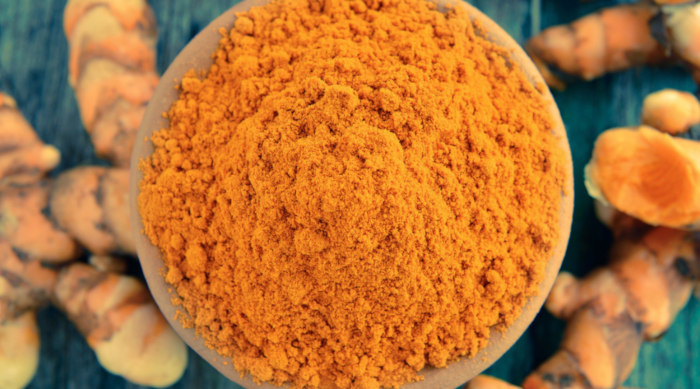
Turmeric Benefits for Heart Health
Many of the common heart problems today are rooted in systemic inflammation. With turmeric’s ability to modulate inflammation, it’s a great ally for addressing heart health issues and for simply maintaining heart health.
Several studies have shown positive benefits in regard to turmeric and heart health.
A group of healthy volunteers aged 40-60 were split into two groups. One group received a low-dose of curcumin extract and the other group was given a placebo. Those receiving the turmeric extract were shown to have reduced triglyceride levels and other inflammatory markers associated with heart disease as compared to those taking the placebo.7
Another study looked at cardiovascular improvements in postmenopausal women taking curcumin and doing regular aerobic exercise. The results showed that these two interventions, supplements and exercise, together can improve the age-related decline in endothelial function.8 (The endothelium is the lining of the blood vessels, and decreased endothelial function is associated with an increased risk of cardiovascular disease.)
Turmeric even helps people who already have heart disease. In one study, researchers showed that a curcumin extract reduced the risk of heart attack in people who had undergone coronary artery bypass grafting.9
There is some evidence that turmeric and curcumin may improve systolic blood pressure when administered in long durations.10
Turmeric Benefits for Immune Support and Cancer Prevention
There are many studies showing that turmeric can prevent many kinds of cancer as well as stop cancer from metastasizing. In a TED talk in 2010, angiogenesis researcher William Li explained how we can eat to starve cancer.11 Angiogenesis is the growth of blood vessels, something that happens normally in humans. However, sometimes this process is too little (resulting in wounds that won’t heal, for example), while too much angiogenesis can result in many chronic diseases, notably cancer. Li highlighted turmeric as a substance that beneficially affected angiogenesis by inhibiting the growth of cancers.
There are many studies, both in vitro and in vivo, showing curcumin’s benefits for both preventing and addressing cancer.
One review of curcumin noted that of all phytotherapies for cancer, curcuminoids seem to be the most promising. The review concluded, “curcumin exhibits anticancer ability by targeting different cell signaling pathways including growth factors, cytokines, transcription factors, and genes modulating cellular proliferation and apoptosis.”12
Another review had positive news for breast cancer patients. “Clinical studies have demonstrated that curcumin alone or combined with other drugs exhibits promising anticancer activity in patients with breast cancer without adverse effects.”13
All reviews I read called for more human clinical trials. I look forward to them! They also noted that curcuminoids are poorly absorbed unless they are enhanced in some way. My hope is that we would eventually see human clinical trials with turmeric as a whole herb medicine, rather than simply with curcumin extracts.
Turmeric Benefits for Flexibility and Joint Health
Turmeric has long been used to support the musculoskeletal system, especially for issues like chronic joint pain and arthritis. A review shares that a traditional remedy in India is a hot poultice made from turmeric and slaked lime, which is applied to injuries to relieve pain and inflammation.14
Turmeric can also be taken preventively to keep the musculoskeletal system healthy.
One randomized controlled trial showed curcumin’s ability to decrease inflammation in patients with osteoarthritis. The patients were split into two groups. One group received curcumin supplements and the other received a placebo. After six weeks, those taking the curcumin supplements had lowered levels of systemic oxidative stress.15
For those with chronic arthritis and other joint problems who also have a lot of dryness, turmeric may not be the best choice. It is recommended to combine turmeric with ghee or marshmallow root to offset its inherent drying qualities (or to look for different herbs with a better energetic match).
Turmeric Benefits for Cognitive Health
Turmeric is most famous for two things. One, its ability to modulate inflammation. Two, its ability to strengthen cognitive health. Growing research shows that inflammation and cognitive decline are linked.16
Turmeric and curcumin are currently being studied extensively for their ability to protect and even restore cognitive health.17 Several human clinical trials are currently being performed.
One of the specific diseases that turmeric is being studied for is Alzheimer’s. Alzheimer’s, like any chronic disease, is complex, and I don’t want to give the impression that taking one herb is going to cure it. However, in one human trial, turmeric was shown to improve the working memory of people who had prediabetes and biomarkers for Alzheimer’s disease.18 (Alzheimer’s has recently been dubbed type 3 diabetes because of its strong correlation to this metabolic syndrome.)
Turmeric Benefits for Healthy Skin and Wound Healing
Turmeric can be used internally and externally to promote healthy skin. Herbalists regularly reach for it for people with acne, eczema, and psoriasis. A human clinical trial showed that a topical paste made with curcumin decreased lesion sizes, pain and burning sensations in patients with oral lichen planus.19
A 2020 review of clinical studies looking at various skin conditions including psoriasis, pruritus, oral lichen planus, facial redness, as well as types of skin cancers determined that turmeric supplementation has been shown to have therapeutic benefits for skin health.20
The powdered root can stop bleeding fast; simply apply it to the wound.
Turmeric can heal fungal infections like ringworm and athlete’s foot. To do this, a paste is made from the powder and applied externally. Keep in mind that turmeric will temporarily stain your skin and anything else it comes into contact with.
In Ayurvedic medicine, turmeric is frequently used for toothaches and to heal gums. A 2019 study showed that turmeric and curcumin were effective in controlling signs and symptoms of oral mucositis.21 In another study, turmeric gel was shown to decrease reduction in plaque and gingival index in humans.22
Turmeric has also been shown to be beneficial for people with scalp psoriasis. In a placebo controlled trial, those taking the turmeric had significantly reduced erythema, scaling and lesions. The patients also reported a better quality of life.23
Turmeric for Diabetes Type 2
Type 2 diabetes is a complex metabolic disorder that results in systemic inflammation and affects numerous organ systems. Turmeric and curcumin can benefit type 2 diabetes patients in numerous ways by modulating inflammation and protecting liver, heart and kidney health.
Turmeric may also help to prevent someone from developing type 2 diabetes. In a trial, 240 pre-diabetic patients were divided into two groups. For nine months, one group received curcumin supplements and the other received a placebo. After nine months, 16% of the placebo group developed type 2 diabetes, whereas no patients in the curcumin group developed the progressed disease.24
Type 2 diabetes is the most common cause of kidney failure, with 44 percent of new cases being attributed to this chronic inflammatory disease.25 Research has shown that people taking turmeric had significant improvements in biomarkers that are risk factors for developing end-stage kidney disease.26
Turmeric Benefits for Menstrual Pain
Turmeric is used to treat a variety of symptoms associated with menstruation. As a blood mover, it moves stagnant blood and reduces clots. It also works as an antispasmodic on smooth muscle tissue, helping to relieve pain associated with cramping.
One human clinical study showed that curcumin, taken seven days before menstruation and until three days after, was shown to alleviate PMS symptoms.27
Botanically Speaking: The Turmeric Plant
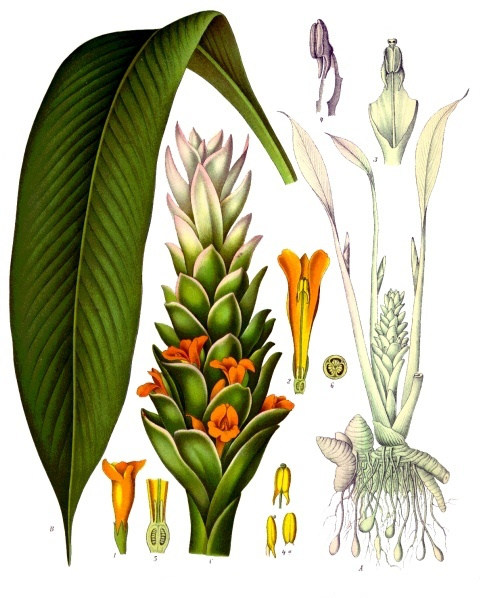 The Turmeric Plant
The Turmeric PlantTurmeric, Curcuma longa, is a perennial herbaceous plant that is native to Southeast Asia and now grows across the world in the warm tropics. There are roughly 40 species of Curcuma. India grows 80% of the world’s turmeric. The United States is the largest importer of turmeric, most of which is used to make commercial mustard yellow.
Turmeric flowers grow on a spike and range from white to yellow to pink. Turmeric plants can reach 3-5 feet tall.
The leaves grow alternately and are long and smooth, tapering at the end.
The rhizomes have a tough, brown sheath covering the bright orange-yellow flesh. These are harvested in the fall and propagated through root cuttings. Most rhizomes are dried and then powdered for use.
Turmeric Uses
There are many ways to bring turmeric into your life, such as food, medicine or even as a dye.
You can work with turmeric rhizomes either fresh or dried. High-quality turmeric has a bright orange color (not dulled yellow or brown). The powder can be used in cooking or to make your own capsules.
Fresh turmeric can also be used in food. It also makes a great juice, which can be used immediately or preserved with alcohol and used as a tincture. (Alcohol is not a great extractor of turmeric.)
When using small amounts of turmeric to maintain health, using it within a variety of foods is a good choice. When taking higher amounts to address a particular health issue, capsules are usually best.
Turmeric is traditionally heated and used with an oil. It is better extracted into a fat medium (such as dairy fat or coconut fat) rather than water.
Curcumin supplements are notoriously difficult for humans to absorb. Adding piperine to curcumin supplements has been shown to increase their bioavailability by 2000%.28 In Ayurveda medicine, black pepper is also traditionally a part of many formulations with turmeric.
Turmeric Dosage Suggestions
- Powder: 1-10 grams per day
- Tincture: 1-5 mL, three times a day
Side Effects of Turmeric
Turmeric used in curries and cooking is probably safe for everyone. However, there are some considerations for using turmeric in large doses.
- Keep in mind that turmeric is warming and drying and may exacerbate hot and dry conditions. It is often combined with ghee or demulcent herbs to offset this effect.
- The following people should avoid turmeric: people who are currently taking blood thinners, have blood clotting disorders, or have known gallstones (although this is controversial).
- Turmeric will stain everything it touches a golden yellow (your hands, cutting board, counters, etc).
Citations for Turmeric Benefits
Click to show/hide.
Rosalee is an herbalist and author of the bestselling book Alchemy of Herbs: Transform Everyday Ingredients Into Foods & Remedies That Healand co-author of the bestselling book Wild Remedies: How to Forage Healing Foods and Craft Your Own Herbal Medicine. She's a registered herbalist with the American Herbalist Guild and has taught thousands of students through her online courses. Read about how Rosalee went from having a terminal illness to being a bestselling author in her full story here.
